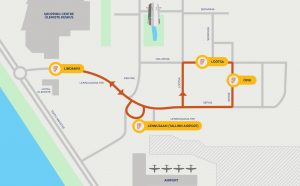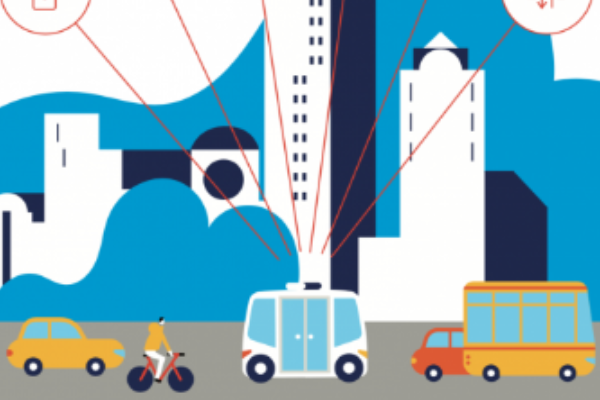Autonomous driving of AV shuttles in the urban environment.
The FABULOS project seeks new solutions and technologies to prepare cities for the future of mobility, including concepts such as self-driving buses. Novel transport solutions will be developed and acquired by utilising a Pre-Commercial Procurement (PCP), which allows the Procuring Partners to share the risks and benefits with the suppliers. The expected outcome of the FABULOS project is the demonstration of automated minibus service as part of the public transport system.
For the companies, the FABULOS pre-commercial procurement process offers the first instance of their solution in use, in addition to financial assistance. The end result, including the Intellectual Property Rights (IPR), remain with the suppliers. For the other stakeholders, the FABULOS pre-commercial procurement serves as source of new information on regulations and the practical implementation, covering the type of technology required, benefits and overall impact, including on a societal level.
During the second phase of the FABULOS pre-commercial procurement, four consortia developed prototypes and tested these in laboratory conditions as well as on closed-street areas. Based on the evaluation by the FABULOS Technical Evaluation Committee, three consortia that reached all the critical thresholds were invited for the third and last phase of the pre-commercial procurement. After evaluation of their offers, all received a contract. The awarded consortia proceeding to field testing of their FABULOS solution in real-life conditions.
Mobile Civitatem Consortium
with four Estonian partners: Modern Mobility, Tallinn University of Technology, AuVeTech and Fleet Complete. This consortium is testing their own Iseauto vehicle, together with new automated driving systems, including smart bus stops.
During the project two cities were operated by our consortium:
TALLINN PILOT
Tallinn is the vibrant and constantly evolving capital of Estonia. The pilot route runs from Tallinn Ülemiste City E-Estonia Briefing Center to the International Airport and from there to an Ülemiste shopping center. Connecting Ülemiste City – the biggest privately owned business campus in Northern Europe – with Tallinn International Airport and Ülemiste shopping center gives an opportunity to test new mobility service with a large number of passengers.
The Tallinn pilot was hosted by the Mobile Civitatem Consortium with four Estonian partners: Modern Mobility, Tallinn University of Technology, AuVeTech, and Fleet Complete. During the pilot period, ISEAUTO was tested, together with new automated driving systems, including smart bus stops.
Autonomous vehicle shuttles did not have a separate lane but drove in traffic. For most of the pilot route, the traffic was up to 30 km/h, one stretch of 500 m from the shopping mall to the airport was up to 50 km/h. The route included both right and left turns. The Ülemiste City quarter has mixed traffic including pedestrians and cyclists at low speed. The shuttle operated in self-driving mode in the vast majority of situations while the option to manually override remained to assist in difficult or preferable circumstances. The shuttles were monitored by human operators remotely by using novel 5G technology.
The image below shows the 2.4 kilometer long route and its stops. The pilot was launched on 18 June 2020 and the three shuttle buses were operational for 50 days until September 2020.

ISEAUTO with 8 seats to be tested
The vehicle is a prototype of ISEAUTO which is an autonomous SAE level 4 electric shuttle developed by Tallinn University of Technology (TalTech) and Auve Tech. ISEAUTO is designed to serve clients in need of transportation in educational and business campuses, healthcare facilities, airports, entertainment districts, and other venues. It can also be used to deliver cargo. The technical specifications are as follows:
- Max cruising speed: 25 km/h (15 mph)
- Operating time: 8 hours per charge
- Capacity: 8 passengers
- Length: 3500 mm (147.79”)
- Width: 1500 mm (59.06”)
- Height: 2400 mm (94.48”)
- Curb weight: 1250 kg (2,755 lbs)
- Wheelchair accessibility: Yes
- Teleoperation capability: Yes

A teleoperation solution is implemented capable to control a number of vehicles over the 5G network. Teleoperation enables monitoring and control of all vehicles from the Remote Control Center and takes over the control in case of ISEAUTO requests help or human intervention is needed.
During the field-tests critical issues, such as cyber-security, safety, V2X, and social acceptance, to make the future public transport safe and secure for urban environments. Tallinn University of Technology, in particular, is dealing with innovative technologies, research, and analysis of self-driving vehicle behavior and mobility based on Ülemiste City experiment. Fleet Complete software is used for bus maintenance and for collecting feedback on shuttle performance.
Advanced Mobility Management Systems
LAMIA PILOT
The Municipality of Lamia constitutes a key-reference point on an administrative, commercial and industrial level in Greece, characterized by its unique geographical diversity and rich cultural heritage. Lamia is considered one of the leading smaller smart cities in Europe, with a long background in European R&I Smart City and Smart Mobility projects where it has been working for the steady modernization and digitalization of its public transportation services and the systematic minimization of private vehicles used within the city.
The Lamia pilot was conducted by the Mobile Civitatem Consortium. It has four Estonian partners including Modern Mobility, Tallinn University of Technology, AuVeTech, and Fleet Complete. During the pilot period, a fleet of two ISEAUTOs was tested, together with new automated driving systems and smart bus stops.
Busy pilot route with pedestrians and bicycles
The FABULOS pilot route was 3,2 km long and included a dedicated bus lane with a speed limit of 40km/h. The route was adjacent to busy pedestrian and bicycle routes, thus forming a vibrant multi-mobility zone in the city. Also, the pilot zone included several key city points of interest, such as the Police headquarters, the Driving Education Park, and one of the five Secondary Schools in the city.
The map below shows the route and its stops. The timing of the deployment was 12 October to 18 December 2020 and the pilot ran 50 days.

The project is finished and the final conference concluded the outcomes and findings of the full Fabulos three-year journey.

